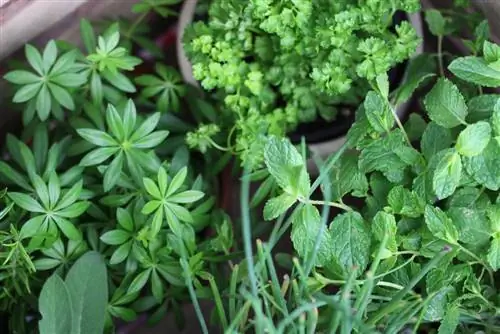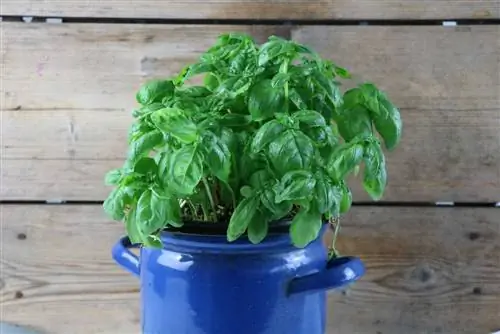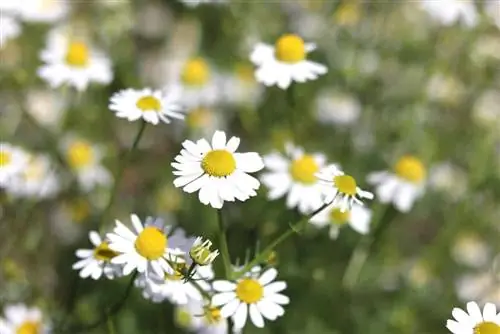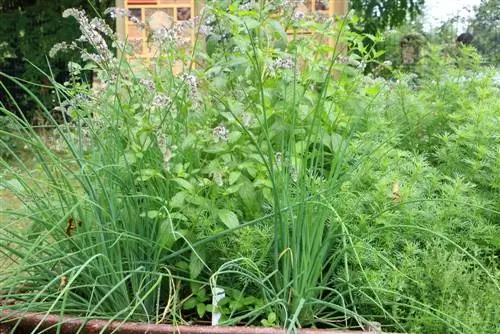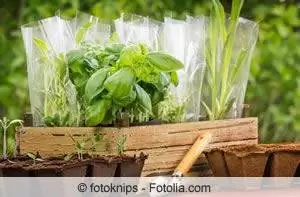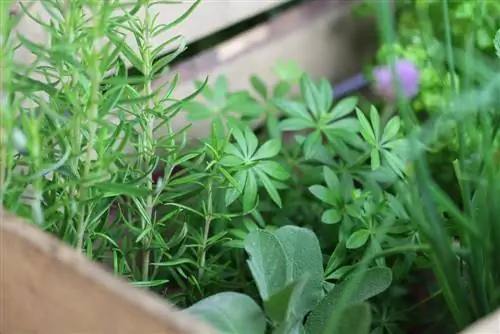- Author admin caroline@plants-knowledge.com.
- Public 2023-12-17 03:39.
- Last modified 2025-01-24 12:45.
You can easily cultivate herbs on the balcony in balcony boxes or large pots. In principle, annual and perennial plants should not be planted together in pots. It is better to plant each category separately, as this requires significantly less work in the fall after the growing season and does not damage the roots of the perennial plants. It is also important to pay attention to which light and soil conditions the individual herbs prefer. In principle: Herbs that grow very quickly and over large areas should rather stand alone.
Why do some herbs go together and others don't?
There are a variety of possible reasons why plants hinder or encourage each other. When the herbs go together, some benefits come into play:
- Scents or other secretions from one plant have a deterrent effect on pests from the neighboring plant
- a type of herb attracts beneficial insects that eat the pests of the neighboring plant
- the herbs extract different nutrients from the soil (mixed culture advantage)
In the worst case scenario, the plants can also interfere with each other. This can have the following causes:
- growth-inhibiting substances are released via the roots of a plant
- the plants have different soil requirements or are both very depleting (soil leaching)
- some herbs become very large and overgrow and crowd out their weakly growing neighbors
Orientation and location of the balcony
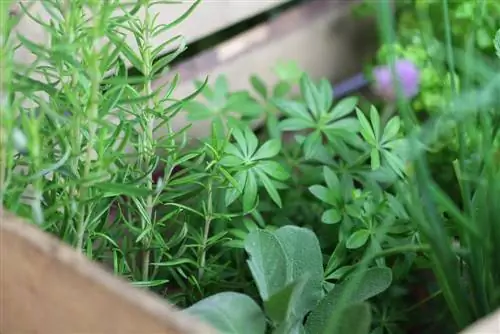
Before planting herbs on the balcony, you should first clarify exactly what lighting conditions there are and how the planters should be arranged.
South
Most herbs like it sunny, but need a little shade in the midday heat. As long as the sun is not blocked by trees or other houses for some time, increased maintenance is necessary. On the one hand, shading can be created here, but the hobby gardener should also be aware that he has to water a lot: in very hot weather in the morning and in the evening!
West or East
With relatively free development (neighborhood and trees), east and west balconies offer ideal conditions for herbs. Here, sunlight only occurs in the morning or afternoon to evening hours. The ratio of shade to sun is good and evaporation is limited. Watering once per day is usually enough here.
South or west balcony
- Basil
- Borage
- Savory
- Dill
- Chervil (with shadow)
- lovage (with shade)
- Marjoram
- Oregano
- Parsley (with shadow)
- Rosemary
- Sage
- Sorrel
- Peppermint
- Thyme
- Lemon balm (with shade)
East balcony
- Wild garlic
- Basil
- Borage
- Watercress
- Dill
- Chervil
- lovage
- Garlic mustard
- Marjoram
- Oregano
- parsley
- Peppermint
- Sorrel
- Chives
- Thyme
- Lemon balm
- Woodruff
North
Balconies facing north have the lowest number of hours of sunshine. But gardeners don't have to do without herbs here either. Since the water doesn't evaporate so quickly here, watering should be done in the morning to avoid waterlogging in the cooler night hours. Here it is best to hang the herbs high or attach them to the outside of the balcony so that they can make optimal use of the short exposure to sunlight.
- Wild garlic
- Comfrey
- Watercress
- Tarragon
- Garlic mustard
- Melissa
- Oregano
- Peppermint
- Chives
- Woodruff
Location on the balcony
Space-saving variants such as hanging baskets can be attached to the ceiling with a hook. Very sun-hungry plants are in good hands on the outside of the balcony in a balcony box. If the balcony cladding is opaque, a place on the ground below can provide the necessary shade for more sensitive plants.
Tip:
Step shelves or ladder shelves also offer plenty of space in a small space.
Annual and perennial plants
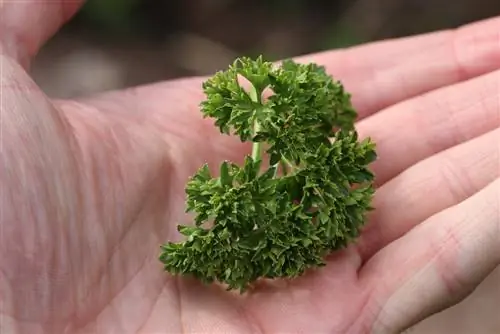
Perennial plants can overwinter on the balcony if they are covered with some straw or brushwood. Since their roots are sensitive to disturbance, annual plants should not be planted between these herbs, which may then have to be removed in the fall.
Annual herbs:
- Basil
- Savory
- Borage
- Dill
- Nasturtium
- Chervil
- Coriander
- Marjoram
- Parsley (actually biennial)
- Pimpinellen
- Rosemary (hardy in warm climates)
Perennial Herbs:
- Wild garlic
- Mugwort
- Watercress
- Curry herb
- Fennel
- Caraway
- Mint
- Melissa/lemon balm
- Sage
- Chives
- Cut celery
- Thyme
- Woodruff
Which herbs go together?
There are some herbs that complement each other well. On the other hand, unfavorable combinations are also possible in which the plants hinder each other or limit each other's growth. These should be planted in separate pots. The following combinations have proven particularly effective:
- Chamomile supports the growth of marjoram, dill, chives, pimpinelle and chervil
- lovage promotes fennel and parsley
- Parsley can be put in a pot with dill and chives
- Rosemary promotes the growth of basil
- Thyme with other Mediterranean herbs such as coriander, tarragon, borage, savory
- Basil protects neighboring plants from mildew and whitefly
- Lemon balm: all other herbs except basil
That doesn't fit:
- Basil with lemon balm (lemon balm)
- Dill with tarragon
- Coriander doesn't like fennel
- Do not plant peppermint with chamomile
- Marjoram unfavorable with thyme
- Vermouth is better alone
Planting Examples
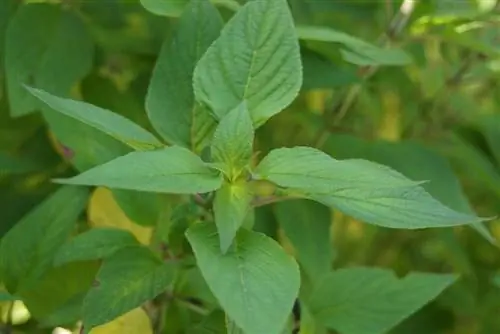
Fit together in a balcony box about 80 centimeters long:
- Strawberry mint, pineapple sage, orange thyme, lemon mint
- Rosemary, lemon thyme, golden sage, oregano, basil
- Herb butter and crickets: borage, cascade thyme, lemon balm, chives, dill
- Thyme, chervil, woolly thyme, basil
- Marigold, Arabian Mint, Thyme, Rosemary
- Sweet herbs: hyssop, lemon balm, Moroccan mint, strawberry mint, honeydew melon sage
- Italian herbs: oregano, thyme, rosemary, mint, basil
- For grilling: chives, parsley, garlic, lemon thyme, basil
- Red basil, purple sage, Moroccan mint, borage
- Sage, lemon thyme, nasturtium, marigold
- Marjoram, parsley, borage, chervil
- Dill, fennel, chamomile, parsley
- Basil, parsley, rocket
- Chives, lemon balm, wild garlic (partial shade)
- Thyme, sage, lemon balm, chives
- Oregano, savory, sage
- Oregano, rosemary, sage, marjoram (full sun)
- Basil, savory, marjoram, rosemary
Care
It is best to sow annual herbs; for perennial herbs, we recommend purchasing young plants from a nursery or garden center. Kitchen herbs from the supermarket are bred for short-term consumption and are generally not suitable for cultivation. Good conditions for growing herbs on the balcony are a good supply of nutrients and water because of the limited root growth. Herbs do not require high nutrient levels. As a rule, a single fertilization at the beginning of the growing season with long-term fertilizers such as horn shavings is sufficient.
How big does the planter have to be?
Annual herbs can be easily planted in balcony boxes. For slow-growing varieties: approximately 15 cm of space is required per plant. Suitable planters are:
- rectangular balcony boxes
- Plant pots
- Hanging baskets
Tip:
When using zinc or mortar pots as planters, holes must be punched in the bottom so that the water can drain away.
Large herbs are best given their own pot. More soil and space for the roots are necessary here. About five liters should be enough. These include:
- Eberraute
- Angelica
- Lavender
- lovage
- Laurel
- Wormwood
- Lemongrass
- Peppermint
Conclusion
With the exception of a few herbs that must under no circumstances be planted together in one pot, the socialization of herbs should be based primarily on the light requirements, the soil conditions and the amount of irrigation water. Annual herbs should not be combined with perennials (care effort required) and strong-growing herbs should not be planted with weak-growing ones, as the fast-growing plant deprives the neighbors of light and thus hinders their growth.

